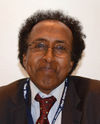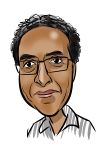Mohamed Ibrahim
 |
 | ||
| Organization: | National ICT and Digital Economy Office | ||
| Affiliation: | I* Organization | ||
| Region: | Africa | ||
| Country: | Somalia | ||
| Email: | mi [at] ayuub.org | ||
| Website: | |||
| Facebook: | |||
| LinkedIn: | |||
| Twitter: | |||
| |||
Mohamed Ibrahim, Head of National ICT and Digital Economy, is Somalia's former Minister of Posts and Telecommunication. Founding Chairman of ISOC Somalia,[1] and .so registry, and [2] a Research Fellow at University of Melbourne and Swinburne University. Mohamed was also the Chairman of the Centre for Research and Dialogue,[3] and Somalia's IGF[4][5][6] Active participant of ICANN conferences, and was involved in the ccNSO and GAC on behalf of Somalia;[7][8] He also represents that country at other fora, such as in AfTLD.[9]
Mr. Ibrahim has been in the IT industry for more than two decades before moving into Academia. He has worked at PNG Elcom, Kuwait Oil Company (80s-90s), UAE High-ed sector (2001-2007). Also in the Australian Public sector; Victorian Government's Health Superannuation Board ('80s), and CIO at Peninsula Health (1998-2003). IT strategy Manager at Deakin University, honorary senior lecturer at Monash University, Lecturer/EdTech at Higher Colleges of Technology, UAE. [10]
Current Work[edit | edit source]
Before he elected to become the Minister of Post and Telecommunication in 2013, Mr. Ibrahim was an advisor to the previous four ministers of telecommunication. As a part of his other assignments, he was contracted to re-establish and modernize the Somali internet registry, which has been active since June 2010; he led a number of important development projects. These include working to implement the fast track process for Somalia's Arabic based IDN, and launching an innovative program to give free email accounts and websites to all Somalis. The latter project involves giving individual domains based on their first and last names under the .me.so domain space and putting the Somali National TV online.[11] He is still involved in both updating and implementing the basics necessary for the .so registry, as well as making .so available to the Somali community at large, albeit at a strategic and policy levels[12]. In these capacities he has been instrumental in setting up opportunities for Somalis to lead unique projects such as digital currency and mobile money, e-learning initiatives (see ssog.edu.so, som-tech.net) for the education sector, online government e-business solutions such as online visa, open data, national and regional ixp, and related initiatives. He is a member of The ITU-T Focus Group on Application of Distributed Ledger Technology (FG DLT) and ITU-T Focus Group on Digital Currency including Digital Fiat Currency. In 2018 he is working on four initiatives with four Australian universities to help Somalia in different areas such as constitution review, cybersecurity, ID and election systems. He is also extensively travellng in the Asia Pacific region attending meetings and conferences with the intention of strengthening south-south knowledge sharing and exchange of ideas.
Interests[edit | edit source]
While much of his career has been spent in the ICT sector, his interests as a scholar extend to globalization, to the role of NGOs in developing countries, to the place of ethics in responsive societies, religious radicalism, and to other areas where technology and humanity intersect. More recently his public service interest has taken him into the legal field. For this purpose, he has upskilled his academic credentials to include, Masters of Public and International law from Melbourne University Law School.[13] His various projects involving rebuilding Somalia's infrastructure stem from his interest in establishing functioning ICT and education systems in that recovering State.[14] He is also interested in mobile and wireless technology, the use of cryptocurrency and blockchain technology in delivering the SDGs for Somalia. He is member of the ITU's sudy groups and his focus is on technology's potential for greater inter and intra scietal communication (see https://www.youtube.com/channel/UCL9oXCdmQju-Ex4AFMcWhJQ)as well as how to balance these with its possible negative tendencies to distract and saturate social processes.[15]
References[edit | edit source]
- ↑ isoc.org
- ↑ elists.isoc.org
- ↑ Arts.Monash.edu.au
- ↑ ICANN 41 Interview
- ↑ aftld.org
- ↑ linkedin.com
- ↑ registration123.com
- ↑ registration123.com
- ↑ AfTLD.org
- ↑ LinkedIn.com
- ↑ ICANN 41 Interview
- ↑ ccNSO.ICANN.org
- ↑ Arts.Monash.edu.au
- ↑ eLists.isoc.org
- ↑ [http://www.elon.edu/e-web/predictions/igf_2010/survey_mobile.xhtml Elon.edu}
